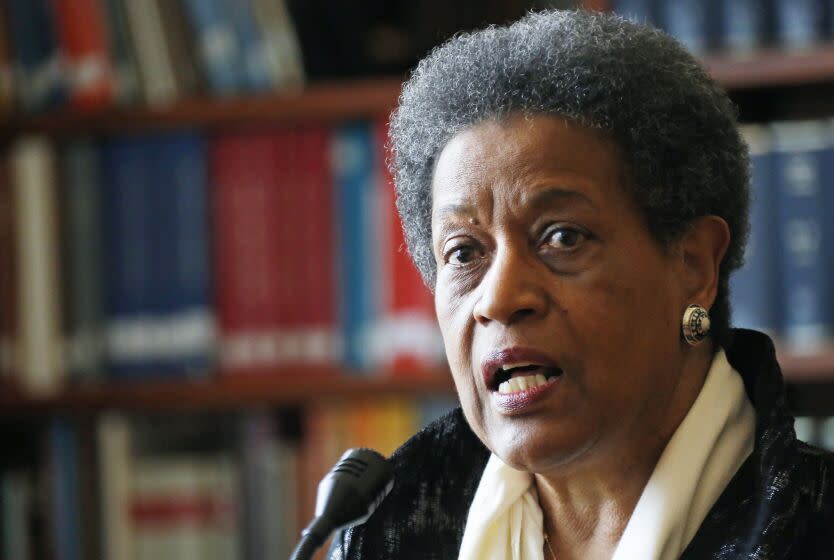Civil rights pioneer and alum Myrlie Evers-Williams donates archival collection to Pomona College

- Oops!Something went wrong.Please try again later.
Former NAACP Chairwoman Myrlie Evers-Williams, widow of civil rights activist Medgar Evers, has donated her archival records to her alma mater, Pomona College, the school announced Thursday.
Evers-Williams, who is a month shy of her 90th birthday, was only 30 when her husband was assassinated in Mississippi in 1963 by a white supremacist. The couple opened the NAACP's local office in the mid-1950s.
After her husband's death, Evers-Williams moved to California and went on to graduate from Pomona in 1968 and continue her activities as a civil rights leader. Over the years, she met at least four presidents and gave the invocation at President Obama's second inauguration in 2012.
"The pain and the scars that come from being my color and living in a segregated society, it's something you don't forget," Evers-Williams said in a video commemorating the college's announcement. "It's something that you gain strength from, not only to survive but to thrive."
After Medgar Evers was shot in their driveway in Jackson, Miss., in 1963, his killer, Byron De La Beckwith, faced two trials by all-white panels that ended in hung juries.
Myrlie and her three children moved to Claremont in 1964 after the trials. Her subsequent life in California — where she ran for Congress and served as Los Angeles Public Works commissioner — is the focus of the archival collection.
"I knew no one here," she said of her move, "like a pioneer."
In 1970, shortly after graduating, she ran for Congress twice: in a special election and then a general election, both for the same San Gabriel Valley seat. Both times she was handily defeated by John Rousselot, a Republican and former official of the John Birch Society.
The John Birch Society, an ultra-conservative organization that was a major force in American politics at the time, "opposed civil rights legislation in the 1960s, saying the African-American freedom movement was being manipulated from Moscow with the goal of creating a “Soviet Negro Republic” in the Southern United States," according to the Southern Poverty Law Center.
In 1987, Los Angeles Mayor Tom Bradley appointed Evers-Williams to be the first Black woman to serve as a commissioner of the Los Angeles Department of Public Works. She served for four years.
Over three decades, she persisted in pushing for social justice causes. In 1994, her husband's killer was convicted of his murder.
Evers-Williams is now retired and resides in Southern California. She was portrayed by actress Jayme Lawson in the movie "Till," released in 2022. The movie was based on the life and death of 14-year-old Emmett Till, who was lynched in 1955 while visiting family in Mississippi.
Pomona will honor Evers-Williams at a ceremony open to the public on March 22 from 5-7 p.m. Tickets must be reserved in advance.
“The College will tend to this collection to educate and encourage others to push forward on the path she did so much to create," Pomona College President G. Gabrielle Starr said.
This story originally appeared in Los Angeles Times.

